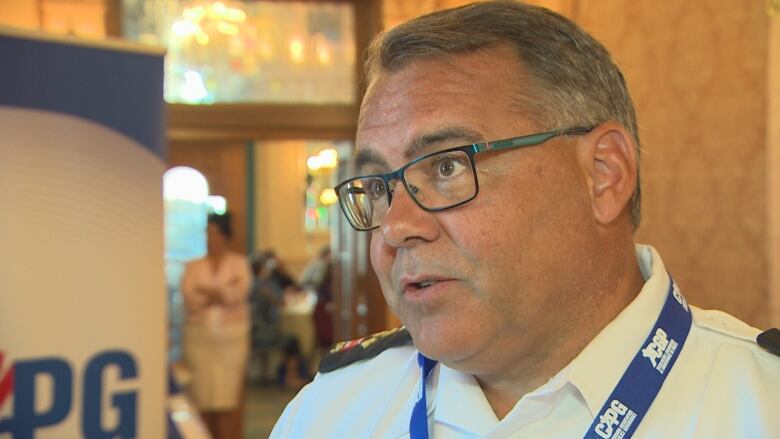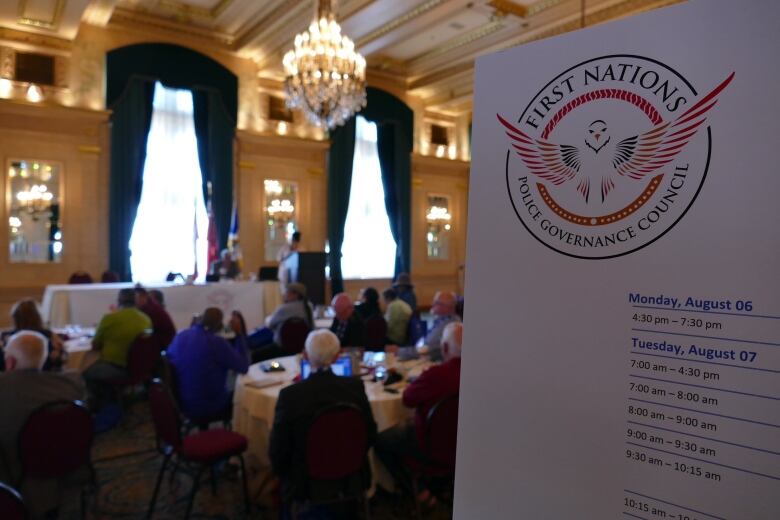Manitoba First Nations want self-run police force on the case, chief says
Desire for self-governance extends to law and order: Manitoba First Nations Police

More First Nations communities in Manitoba want to be policed by officers who understand their traditions and customs, says the chief of the Manitoba First Nations Police.
Rick Head said the police service's desire to growis feltby his colleaguesnationwide, who gathered in Winnipeg for the annual conference of theFirst Nations Police Governance Council on Tuesday.
That sentiment has only been bolsteredafter the federal government promised earlier this year to inject$291 million into improvingpolicing onFirst Nations and inInuit communities.
"We want First Nations to be able to have the choice of who does their policing, and obviously a large part of self-governance with Indigenous communities is the policing service," Head said.
The police force, formerly known as the Dakota Ojibway Police Service, operates in six Manitoba communities, including Roseau River and BirdtailSioux. Swan Lake First Nation's council also wants to be patrolled by the service, but the chief and council are waiting for funding approvals from other levels of government,Insp. Dave Scott said.
Rolling River First Nation and other northern communitieshave also expressed interest, but the police service needs more funding to be able to expand, Scott said. They're still not sure whether they'll get enough of the new fundingto serve more communities.
Community-based policing resonates with Indigenous people, Scott said.
"Ifthere's a First Nationspolice service that is cognizant of the cultures and traditions,it can be taken to the community andbuild kind of a new police model, which incorporates more of a restorative justice oversight."

Policing that focuses on rehabilitation over punishmenthashistorically been supported by Indigenous people, said Dan Bellegarde, one of the founding members of the First Nations-led police governance body.
"We have a tradition of policing ourselves it's not as if we're a lawless people."
Of the 38 self-administered police services in the country, only six are west of Ontario, said Bellegarde, who chairs the File Hills First Nation policing unit in southern Saskatchewan.
He believes that's not enough.
"It's one of the most treasured principles of policing services, that you must police from your own communityand be supported by your own community," he said.
In January, Ottawa promised nearly $300 million over a five-year period to aid policing efforts in First Nations communities, following legal challenges and years of complaints that they've been chronically underfunded and their officers underpaid.
Ron Skye, chairman of the First Nations Police Governance Council, said the federal funds are slated to improve salaries, hire new officers and buy new equipment.
The government has also promised to overhaul the way it fundspolice services in First Nations communities to address long-standing issues.Ottawa currently pays about 52 per cent of thecost, while provinces and territories pay the rest.
Skye said more involvement from Indigenous people would only help them administerlaw and order.
"If you're looking at the overrepresentation of Indigenous population in incarceration, maybe we have to look at how we dispense justice better."
Local recruitment
One way to address theissues is to ensuremore officers in First Nations police servicesarefrom the community, but that can be a challengein rural centres.
"You may have to arrest your brother," Skye said."You may have to arrest your father, your cousin."
Tonia Williams,with the KahnawakePeacekeepers in Quebec, told the conference the benefit in employing Indigenous officers is undeniable. Officers invested in the communityare naturally inclined to diffuse situations rather than useforce, she said.













_(720p).jpg)


 OFFICIAL HD MUSIC VIDEO.jpg)
.jpg)



























































































